Cat friendly indoor hanging plants – Cat-friendly indoor hanging plants are not only aesthetically pleasing but also provide numerous benefits for both you and your feline companion. These plants can purify the air, reduce stress, and create a more inviting living space. In this article, we will explore the best cat-friendly indoor hanging plants, their benefits, and how to care for them.
Non-Toxic Plants
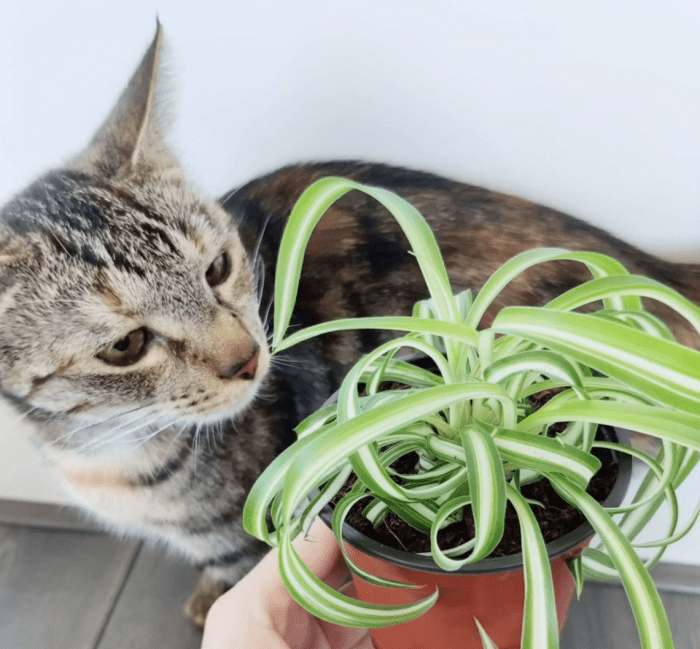
For cat owners seeking to beautify their homes with greenery, choosing non-toxic indoor hanging plants is crucial to ensure the safety and well-being of their feline companions. Non-toxic plants offer numerous benefits while mitigating potential risks associated with toxic varieties.
Non-toxic plants, as the name suggests, lack substances that can cause adverse effects in cats. Ingesting these plants poses no danger to cats, allowing owners to enjoy the aesthetic appeal of greenery without worry.
Benefits of Non-Toxic Plants, Cat friendly indoor hanging plants
- Peace of mind:Non-toxic plants eliminate the anxiety associated with potential plant toxicity, ensuring cat owners can enjoy their greenery without fear.
- Enhanced air quality:Plants contribute to improved indoor air quality by removing pollutants and releasing oxygen, benefiting both cats and humans.
- Stress reduction:The presence of greenery has been shown to reduce stress levels in both cats and humans, creating a more calming and relaxing environment.
Importance of Avoiding Toxic Plants
Toxic plants pose significant risks to cats, with ingestion potentially leading to a range of health issues, including gastrointestinal distress, neurological problems, and even organ damage. Some common toxic plants for cats include:
- Lilies
- Daffodils
- Tulips
- Oleander
- Sago palm
By avoiding toxic plants and opting for non-toxic varieties, cat owners can create a safe and healthy living environment for their furry friends.
Air-Purifying Plants
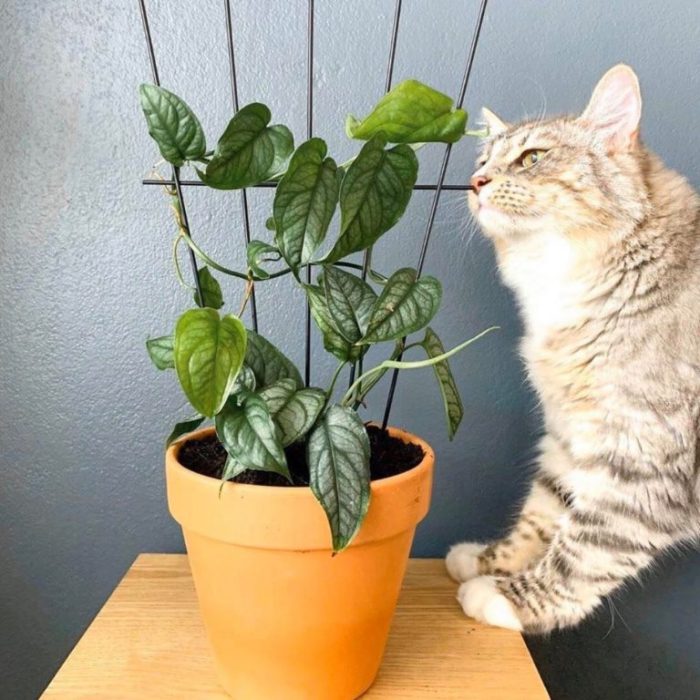
Indoor hanging plants not only add a touch of greenery to your home but also have the ability to purify the air and remove toxins. Certain species of plants have been found to be particularly effective in removing harmful pollutants from the air, making them ideal for creating a healthier indoor environment.
The air-purifying capabilities of plants are attributed to their ability to absorb and break down pollutants through various mechanisms. Some plants have specialized stomata, or pores, that allow them to absorb volatile organic compounds (VOCs) from the air. VOCs are emitted from a variety of sources, including cleaning products, paints, and building materials, and can have adverse effects on human health.
Other plants release beneficial compounds into the air that can neutralize harmful pollutants. For example, the peace lily ( Spathiphyllum wallisii) releases a compound called alpha-pinene, which has been shown to reduce the levels of formaldehyde in the air.
Research and Studies
Numerous research studies have supported the air-purifying capabilities of indoor hanging plants. One study, conducted by NASA, found that certain plants, including the snake plant ( Sansevieria trifasciata), the spider plant ( Chlorophytum comosum), and the peace lily ( Spathiphyllum wallisii), were effective in removing VOCs from the air.
Cat owners seeking air-purifying indoor hanging plants can consider options that not only improve air quality but also cater to their feline companions’ safety. Among the best air purifying hanging plants here , several are known for their pet-friendliness, such as the spider plant, air plant, and bird’s nest fern.
These plants help remove toxins from the air, creating a healthier environment for both cats and humans.
Another study, published in the journal Environmental Science & Technology, found that the spider plant was particularly effective in removing formaldehyde from the air. The study also found that the plant released beneficial compounds into the air that could neutralize other pollutants.
Aesthetic Appeal
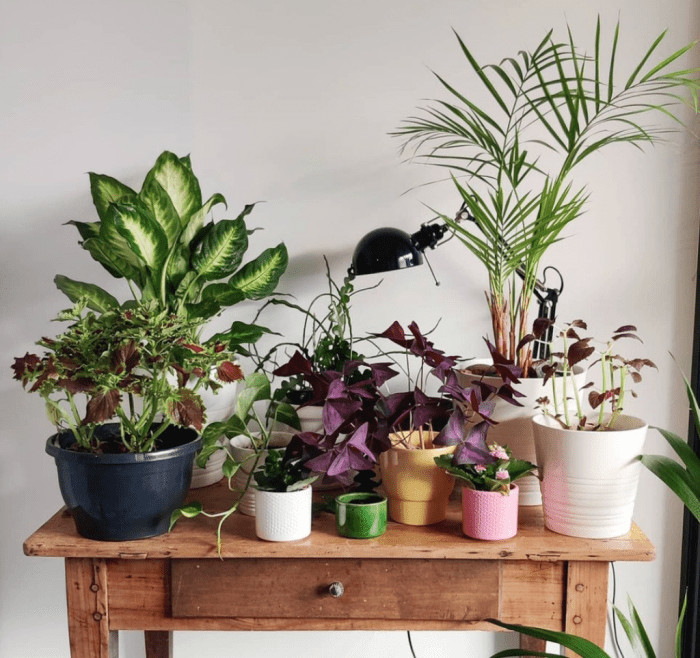
Cat-friendly indoor hanging plants offer not only a safe and healthy environment for feline companions but also enhance the overall aesthetic appeal of the home. These plants add a touch of greenery, freshness, and natural beauty to any space.
Incorporating hanging plants into home décor provides ample opportunities for creativity and personalization. They can be suspended from the ceiling, hung from shelves or window frames, or placed on plant stands. By varying the height and placement of the plants, homeowners can create a dynamic and visually interesting display.
Psychological Benefits
Research has shown that having plants in the home can have numerous psychological benefits. Studies indicate that plants can reduce stress levels, improve mood, and boost creativity. They also help to purify the air and create a more calming and inviting atmosphere.
Cat owners looking for indoor hanging plants that are both safe and attractive for their feline companions should consider options such as the spider plant, which is non-toxic and air-purifying. For those seeking a more aesthetically pleasing hanging plant, the best indoor plant for hanging baskets include the trailing pothos, which is known for its lush foliage and easy maintenance.
These cat-friendly hanging plants add a touch of greenery and enhance the air quality of any indoor space.
Plant Care and Maintenance: Cat Friendly Indoor Hanging Plants
To ensure your cat-friendly indoor hanging plants thrive and remain healthy, it is essential to provide proper care and maintenance. Understanding their specific needs, such as watering, sunlight, and any special requirements, is crucial. Here’s a comprehensive table outlining the care requirements for each plant:
| Plant | Watering | Sunlight | Special Needs |
|---|---|---|---|
| Spider Plant | Water when the soil feels dry to the touch | Bright, indirect light | None |
| Boston Fern | Water regularly, keeping the soil moist but not soggy | Indirect light, avoid direct sunlight | Mist regularly to maintain humidity |
| Pothos | Water when the top inch of soil feels dry | Bright, indirect light, can tolerate low light | None |
| Snake Plant | Water sparingly, allowing the soil to dry out completely between waterings | Low to bright, indirect light | Avoid overwatering |
| Burro’s Tail | Water only when the soil is completely dry | Bright, indirect light, can tolerate direct sunlight for short periods | Use a well-draining cactus mix |
Additionally, here are some general tips for keeping these plants healthy and thriving:
- Use well-draining potting mix and pots with drainage holes to prevent root rot.
- Fertilize monthly during the growing season with a balanced liquid fertilizer.
- Repot plants as they grow larger, using fresh potting mix.
- Prune dead or damaged leaves regularly to encourage new growth.
- Protect plants from extreme temperatures and drafts.
By following these care instructions, you can ensure that your cat-friendly indoor hanging plants remain vibrant and healthy, adding beauty and greenery to your home while providing a safe environment for your feline companion.
Cat-friendly indoor hanging plants can provide a safe and stimulating environment for your feline companion. Consider adding some best indoor cascading plants to your home, such as spider plants or pothos, which are both non-toxic to cats and offer long, trailing vines that can create a playful and inviting space for your furry friend.
Plant Toxicity and Safety
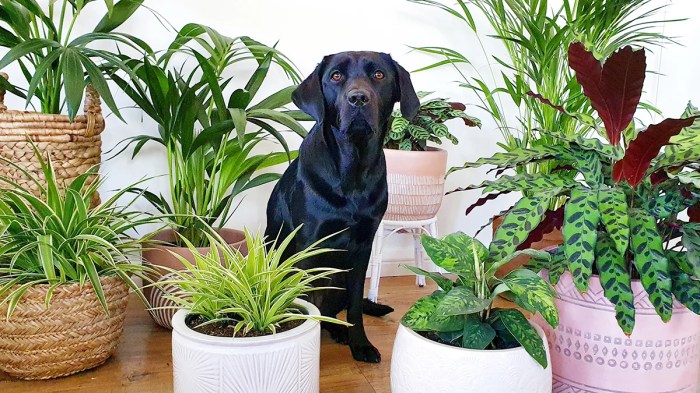
Indoor hanging plants can pose potential hazards to cats, as some species contain toxic substances that can cause illness or even death if ingested. It is crucial for cat owners to be aware of these plants and take precautions to keep their pets safe.
The level of toxicity in plants varies widely, with some causing only mild symptoms, while others can be fatal. The severity of the reaction depends on the amount of plant ingested, the specific toxin present, and the individual cat’s sensitivity.
Highly Toxic Plants to Avoid
The following plants are highly toxic to cats and should never be kept in homes with feline companions:
- Sago palm (Cycas revoluta)
- Castor oil plant (Ricinus communis)
- Lily of the valley (Convallaria majalis)
- Autumn crocus (Colchicum autumnale)
- Daffodil (Narcissus spp.)
- Foxglove (Digitalis purpurea)
- Oleander (Nerium oleander)
- Rhododendron (Rhododendron spp.)
- Yew (Taxus spp.)
Even small amounts of these plants can cause severe poisoning in cats. Symptoms of plant poisoning can include vomiting, diarrhea, abdominal pain, tremors, seizures, and difficulty breathing. If you suspect your cat has ingested a toxic plant, seek immediate veterinary attention.
Last Point
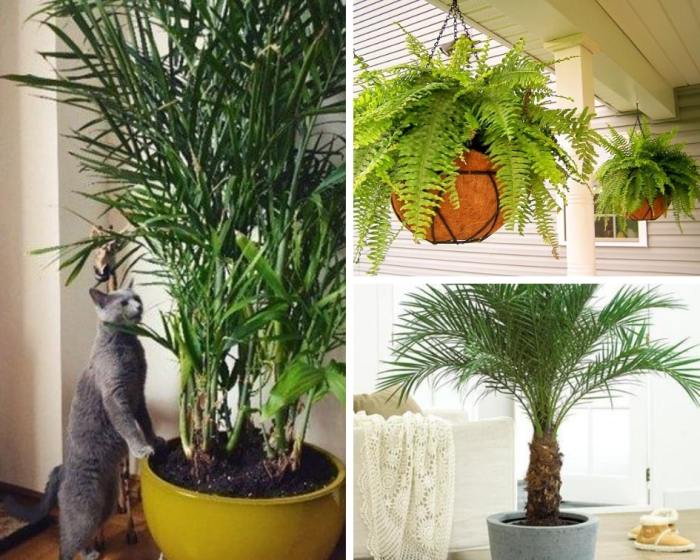
Incorporating cat-friendly indoor hanging plants into your home is a great way to improve your indoor air quality, reduce stress, and provide a stimulating environment for your cat. With proper care and maintenance, these plants can thrive and bring joy to your home for years to come.
Helpful Answers
What are the benefits of having cat-friendly indoor hanging plants?
Cat-friendly indoor hanging plants offer numerous benefits, including air purification, stress reduction, and aesthetic appeal.
How do I choose the right cat-friendly indoor hanging plant for my home?
When choosing cat-friendly indoor hanging plants, consider factors such as toxicity, air-purifying capabilities, and aesthetic appeal.
How do I care for cat-friendly indoor hanging plants?
Cat-friendly indoor hanging plants require specific care, including watering, sunlight, and occasional pruning.